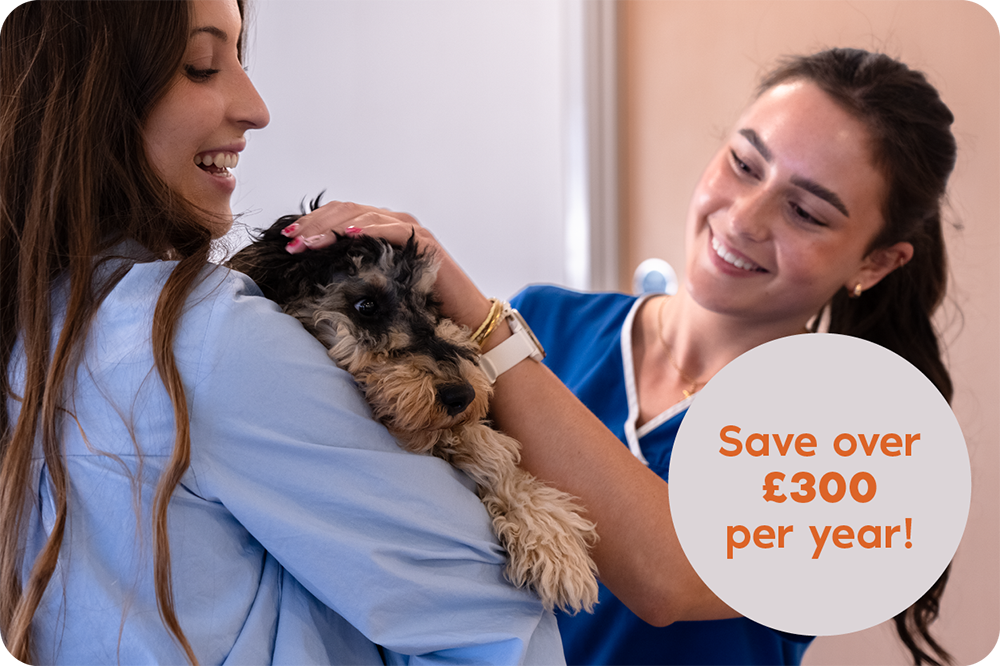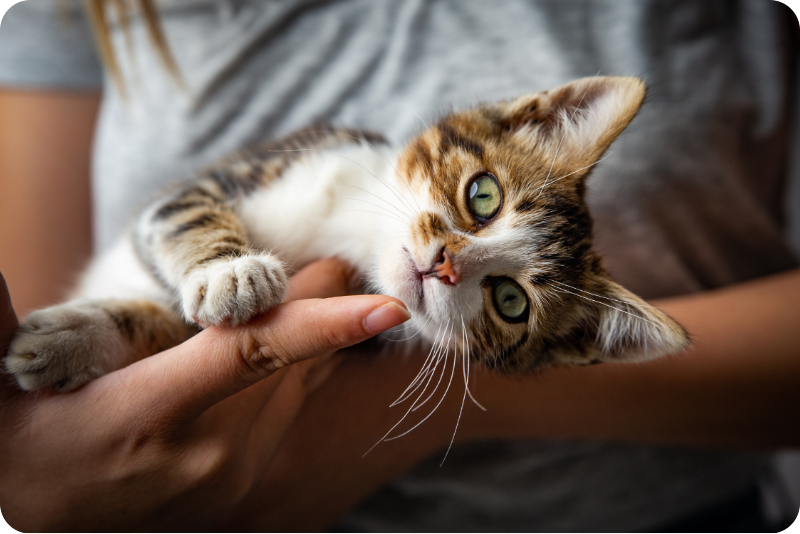Vaccinating your pet is one of the most important steps you can take to prevent them from becoming unwell. Cats, dogs, rabbits, and ferrets can all be protected from life-threatening diseases by vaccines.
Quick Links
Why Vaccinate Your Pet?
Vaccination is crucial for a variety of reasons:
- Protect Your Pet.
Vaccines protect pets from a range of unpleasant and potentially fatal diseases. Parvovirus (in dogs), Feline Leukaemia Virus (in cats), and Viral Haemorrhagic Disease (in rabbits) are all examples of diseases that are often fatal, but can be prevented with vaccines. - Protect Your Family.
Some diseases, like leptospirosis, can be transmitted to humans. Vaccinating your pet protects not just your animal but also your family, friends, and the wider community from these diseases. - Improve Your Pet’s Quality of Life
Many of the diseases that we vaccinate against can cause pets to become seriously unwell, even if they do not prove fatal. Others may cause persistent symptoms that can last for weeks, months, or even years in some cases. Preventing illness avoids unnecessary suffering, pain, and potential long-term health problems.
Vaccinations for Dogs
All dogs should receive regular vaccinations, even if they spend little time outdoors or do not interact with other dogs. Many of these diseases do not require direct contact between your dog and another animal to spread, and they can enter your home on clothing or shoes.
There are two types of vaccines for dogs:
- “Core” vaccines are ones that every dog should receive.
- “Non-Core” vaccines are only recommended for certain dogs, based on their lifestyle.
Core Vaccines:
-
- Parvovirus: Parvovirus attacks a dog’s stomach and intestines, causing vomiting, diarrhoea, and dehydration. It usually requires treatment in a veterinary hospital and is sadly often fatal, especially in puppies.
- Distemper Virus: This virus affects a dog’s lungs, stomach, intestines, and nervous system. It can be fatal, and dogs that recover often have lifelong side effects.
- Adenovirus: Also known as Infectious Hepatitis, this virus infects dogs’ livers. It can cause life-threatening liver failure in unvaccinated dogs.
- Leptospirosis: A bacterial infection that can cause liver and kidney failure. It is transmitted through contact with contaminated water or soil, particularly in areas where rodents live, and can also be transmitted to humans.
- Non-Core Vaccines:
- Bordetella & Parainfluenza Virus (Kennel Cough): Kennel cough is a group of contagious respiratory diseases, often spread in kennels or other places where dogs gather together. It is recommended for dogs who regularly visit areas where dogs gather, such as parks, dog shows, groomers, or training classes.
- Rabies: The Rabies virus is not found in the UK, but vaccination is required for dogs who travel abroad, so that they do not reintroduce it to the country. Rabies is always fatal in both dogs and humans, so it’s vital to protect yourself and your dog if you are travelling to an area where it is found.
Your vet will discuss your dog’s individual situation with you and recommend vaccines which are appropriate for them.
Vaccinations for Cats
All cats should receive regular vaccinations, even if they are indoor-only pets. Many of these diseases do not require direct contact between your cat and another animal to spread, and they can enter your home on clothing or shoes.
There are two types of vaccines for cats:
- “Core” vaccines are ones that every dog should receive.
- “Non-Core” vaccines are only recommended for certain dogs, based on their lifestyle.
- Core Vaccines:
- Feline Calicivirus (FCV): This highly contagious virus affects a cat’s nose, mouth, and throat system, leading to symptoms like coughing, sneezing, and ulcers.
- Feline Herpesvirus (FHV-1): Another virus that causes nose and throat in cats, and can also affect their eyes. It is highly contagious and can cause long-term health problems.
- Feline Panleukopenia (Distemper): A serious viral disease that attacks a cat’s immune system, leading to fever, vomiting, and severe dehydration. It is sadly often fatal, especially in kittens.
- Non-Core Vaccines:
- Feline Leukemia Virus (FeLV): This virus can suppress a cat’s immune system and make them more susceptible to infections, and can also cause Leukaemia, a type of cancer. It’s recommended for all kittens, and for adult cats that go outdoors or have exposure to other cats.
- Chlamydia: A bacterial infection that affects the respiratory system, causing conjunctivitis and sneezing.
Your vet will discuss your cat’s individual situation with you and recommend vaccines that are appropriate for them.
Vaccinations for Rabbits
All rabbits should be vaccinated to protect them from certain dangerous diseases. Even indoor rabbits can catch these infections, and sadly, they are usually fatal.
Vaccinations for rabbits include:
- Rabbit Haemorrhagic Disease (RHDV): This virus causes internal bleeding and severe liver damage, and often results in death. It is highly contagious and can spread quickly among rabbits.
- Myxomatosis: This virus causes severe swelling and infections, leading to death in many cases. It is spread by mosquitoes, fleas, and direct contact between rabbits.
Vaccinating your rabbit is essential to prevent these illnesses and ensure a long, healthy life.
When Should My Pet Be Vaccinated?
- Puppies and Kittens:
Vaccinations should start once your pet is over eight weeks old. They will need a course of injections – usually two or three – to be fully protected. Your vet will guide you through the recommended schedule. - Adult Cats and Dogs:
Once your pet has received a course of vaccines, they will need regular boosters to make sure they stay protected. Most pets will need one every year, but for a few pets, it might be every three years. Your vet can give you a personalised recommendation for your pet. - Rabbits
A single injection is all that is needed to protect your rabbit against common diseases. This can be done once your rabbit is five weeks old, and needs to be boosted every year. - Senior Pets
Older pets still need to be protected against these serious diseases. In fact, their immune system may work less well as they get older, so it may be even more important to keep them boosted. Speak to your vet about the best approach for your senior pet.
Find your local practice and call us or click here to book your pet’s vaccination appointment. Remember, prevention is always better than treatment, so don’t wait—vaccinate!
Find a Vet Practice Near You
Our Latest News and Advice

Join our Pet Healthcare Plan, the Kin Care Club.
Our comprehensive pet healthcare plan is designed to help you give your cat or dog the best care, while keeping your budget in mind.
Whether you’re looking for essential coverage or complete peace of mind, the Kin Care Club offers two flexible plans tailored to your needs and your pet’s well-being.




